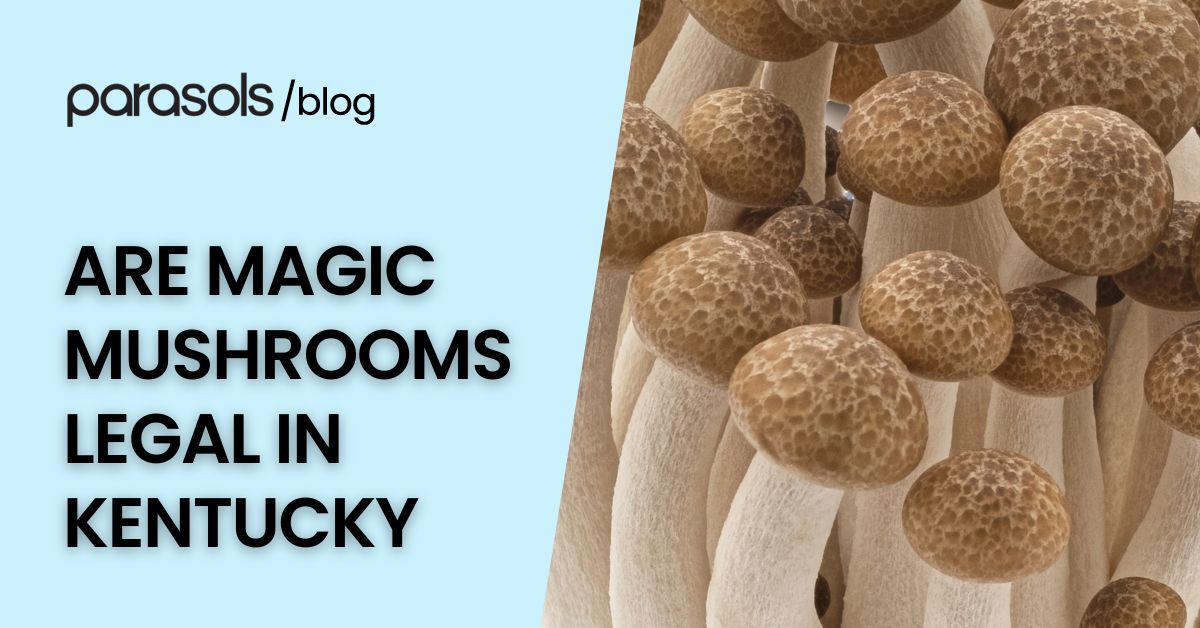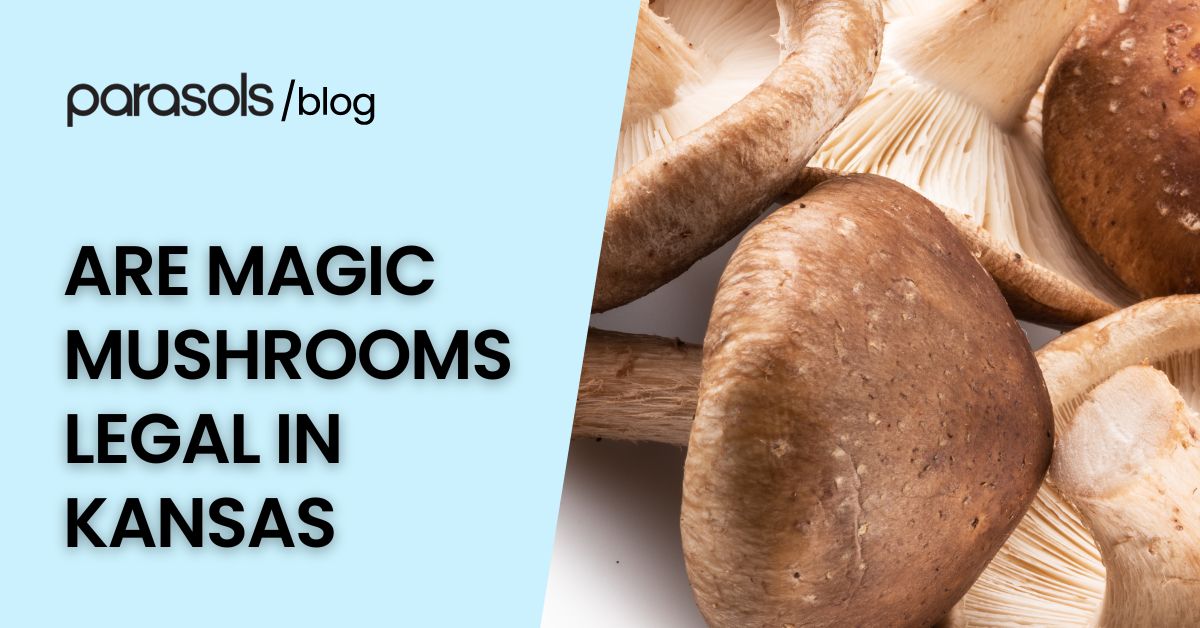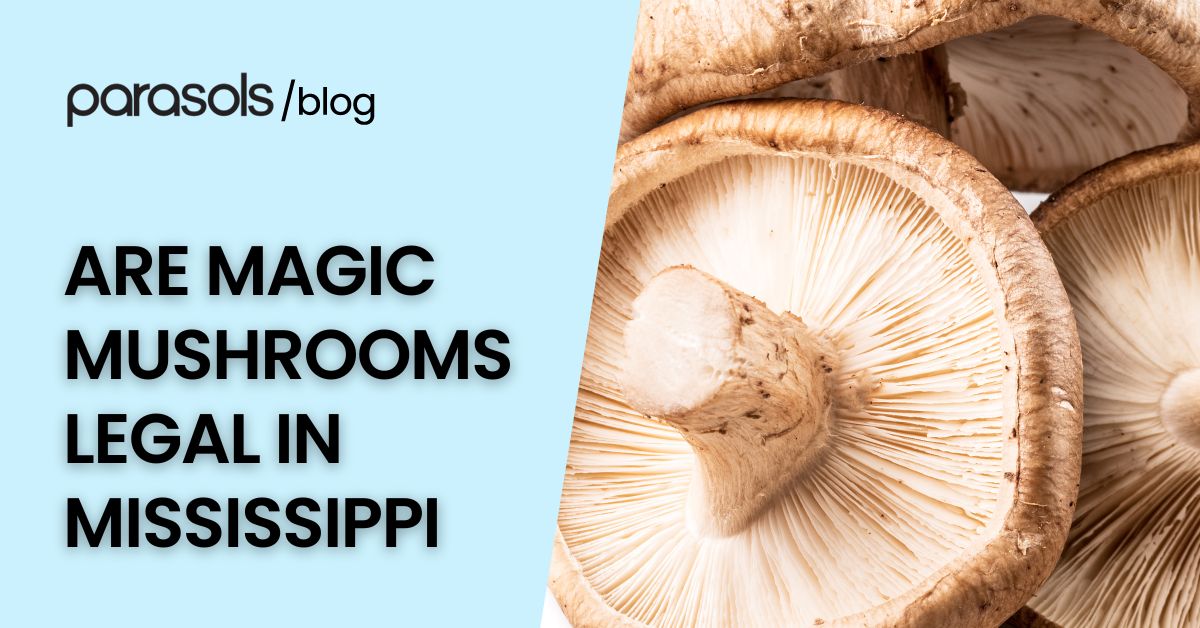More and more people are curious about psychedelic substances like psilocybin mushrooms, especially with research highlighting their potential therapeutic benefits and other states moving toward psychedelic legalization. But here in the Bluegrass State, things aren’t so clear. Kentucky law, along with federal regulations under the Controlled Substances Act, still classifies psilocybin as illegal, leaving residents in a tricky spot.
This guide breaks down the current legal status of magic mushrooms in Kentucky so you know what’s allowed, what isn’t, and what it could mean for anyone considering personal use or studying mental health treatments.
Key Takeaways
- Psilocybin mushrooms are illegal in Kentucky under state and federal law.
- Possession can lead to felony charges, with penalties ranging from fines to years in prison.
- Cultivation and distribution are treated as manufacturing and trafficking, carrying harsher sentences.
- Spores aren’t scheduled but can still trigger charges if used for cultivation.
- No legal pathways exist for medical, therapeutic, or research use of psilocybin in Kentucky.
- Alternatives like ketamine therapy, amanita muscaria, and breathwork are legally accessible.
- Kentucky has introduced no decriminalization or legalization bills, keeping laws strict.
Overview on Psilocybin Mushrooms
Psilocybin mushrooms — often called magic mushrooms or just shrooms — are a psychedelic substance that contain the naturally occurring compound psilocybin. Once eaten, psilocybin turns into psilocin in the body, a hallucinogenic compound that can shift how you see the world, affect your mood, and even change how you think.
These mushrooms aren’t new. They’ve been part of spiritual practices and entheogenic traditions for centuries. What’s different today is the renewed spotlight from scientific studies and medical research. Preliminary findings suggest psilocybin may offer real therapeutic benefits, especially for mental health treatments like easing depression, reducing symptoms of PTSD, and helping with anxiety.
Are Magic Mushrooms Legal in Kentucky?
In Kentucky, magic mushrooms are illegal. Both federal law and Kentucky law classify psilocybin mushrooms as controlled substances with no accepted medical use. That means growing them, having them, or selling them is considered a crime and can lead to serious consequences.
Psilocybin mushroom spores fall into a gray area. Since they don’t actually contain the psychoactive compound, they aren’t explicitly scheduled under the Controlled Substances Act. Still, if those spores are used to cultivate psilocybin mushrooms, it can bring criminal charges under state laws and federal regulations.
Laws Surrounding Magic Mushrooms in Kentucky

In the Bluegrass State, psilocybin mushrooms are tightly controlled under both state laws and federal regulations. Here’s how the legal status breaks down across different areas:
Distribution and Sale
Selling or distributing psilocybin mushrooms is treated as drug trafficking under Kentucky law. Penalties can be severe, with even harsher consequences if sales involve minors or happen near schools. Convictions often carry the risk of lengthy prison sentences.
Psilocybin Spores
Psilocybin mushroom spores don’t contain the active hallucinogenic compound, so they aren’t explicitly banned. But if law enforcement suspects they’re being used to cultivate psilocybin mushrooms, possession can still lead to criminal charges under broader controlled substances laws.
Federal and State Overlap
Psilocybin remains illegal under the federal Controlled Substances Act, and Kentucky law mirrors those federal rules. That means someone caught trafficking, cultivating, or manufacturing psilocybin mushrooms could face charges at both the state and federal level.
Law Enforcement Approach
Unlike cities in other states that have moved toward psychedelic decriminalization or reduced penalties, Kentucky has not made psilocybin a low law enforcement priority. Cases are still actively investigated and prosecuted.
Medical and Therapeutic Context
Even though scientific studies and medical research highlight potential therapeutic benefits for mental health treatments, Kentucky law doesn’t recognize psilocybin for any accepted medical use. No licensed facilities in the state are permitted to provide psilocybin therapy, and clinical trials remain unavailable under current law.
Punishment for Use and Possession of Magic Mushrooms in KY
Kentucky law takes psilocybin mushrooms seriously, and penalties can be severe no matter the amount or intent. Here’s what someone caught with magic mushrooms could face under state laws:
- Class D felony (possession of a Schedule I substance) – Having psilocybin mushrooms is treated as a felony offense. This can mean 1 to 3 years in prison and potential fines, even if the amount is small and meant only for personal use.
- Repeat offenses – Prior drug convictions make things worse. Penalties may include mandatory minimum sentences and longer prison terms.
- Class A misdemeanor (for small amounts) – In some cases, if the quantity is minimal and there’s no sign of intent to distribute, charges may be reduced to a misdemeanor. This carries up to 12 months in jail and fines of up to $500.
- High fines for felony convictions – A felony conviction doesn’t just bring prison time. Courts can also impose fines up to $10,000, depending on the case.
-
Distribution and trafficking – Selling or distributing psilocybin mushrooms is treated as drug trafficking. Penalties are much harsher, ranging from 5 to 10 years in prison, along with fines that can reach $20,000.
Magic Mushroom Alternatives in KY
Because psilocybin mushrooms remain illegal in the Bluegrass State, some people interested in altered states of consciousness or alternative mental health treatments turn to legal or more accessible options. Here are a few:
- Amanita muscaria (fly agaric mushroom) – This mushroom is legal and contains muscimol, a compound with sedative and mildly hallucinogenic effects. It’s very different from psilocybin mushrooms but sometimes used for its psychoactive properties.
- Ketamine therapy – Available in licensed clinics across Kentucky, ketamine is legally administered under medical supervision. It’s often used off-label to help with treatment-resistant depression, PTSD, and other mental health issues.
- Kratom, kava, wild lettuce, and DXM – These over-the-counter substances can produce effects ranging from relaxation to mild euphoria or sedation. They’re legal but not without risks, so caution is advised.
- Holotropic breathwork – A guided breathing practice that can create altered states of consciousness without using any drugs. People often use it for emotional release, self-exploration, or therapeutic insight.
-
Clinical trial participation – While not widely available in Kentucky, federally approved clinical trials sometimes offer access to psilocybin, MDMA, or other psychedelics for research purposes. This provides a legal way to study potential therapeutic benefits under strict supervision.
Future Outlook for Shrooms in Kentucky

The outlook for psilocybin mushrooms in Kentucky is cautiously optimistic, but progress is slow. While other states and even some cities across the country have started to decriminalize possession or study psilocybin therapy through licensed facilities, Kentucky hasn’t taken those steps yet. There’s been no active legislation introduced in the state senate to reclassify or decriminalize psychedelic substances.
Still, interest keeps building. Scientific studies and medical research continue to highlight psilocybin’s therapeutic potential for mental health treatments, especially for conditions like PTSD, depression, and anxiety. But until Kentucky lawmakers consider regulatory frameworks or pilot programs, psilocybin mushrooms will remain illegal at both the state level and under federal regulations.
Final Thoughts
In Kentucky, magic mushrooms remain illegal, but curiosity about their therapeutic potential continues to grow. Until lawmakers make changes at the state or federal level, it’s important to approach this topic carefully and stay informed about the risks.
To study safe alternatives and keep up with policy updates, check out our guide to psilocybin laws and treatment options in Kentucky.
Frequently Asked Questions
Can I travel through Kentucky with psilocybin mushrooms if they’re legal in another state?
No. Even if psilocybin is legal or decriminalized in another state, possession while in Kentucky is illegal and can lead to criminal charges under state law.
Are there any cities in Kentucky considering psilocybin decriminalization?
As of now, no cities in Kentucky have passed or proposed ordinances to decriminalize psilocybin or make it a lowest law enforcement priority.
Is psilocybin therapy available in Kentucky through licensed providers?
No. There are currently no licensed facilities or therapists in Kentucky authorized to administer psilocybin-assisted therapy.
Can I legally order psilocybin mushroom spores online in Kentucky?
Spores may be sold for research or microscopy purposes, but if they are used or intended for cultivation, possession could still result in criminal prosecution.
What substances are often confused with psilocybin mushrooms?
Some toxic wild mushrooms resemble psilocybin species and can cause serious harm if misidentified. Always avoid wild foraging unless properly trained.



Leave a comment
This site is protected by hCaptcha and the hCaptcha Privacy Policy and Terms of Service apply.